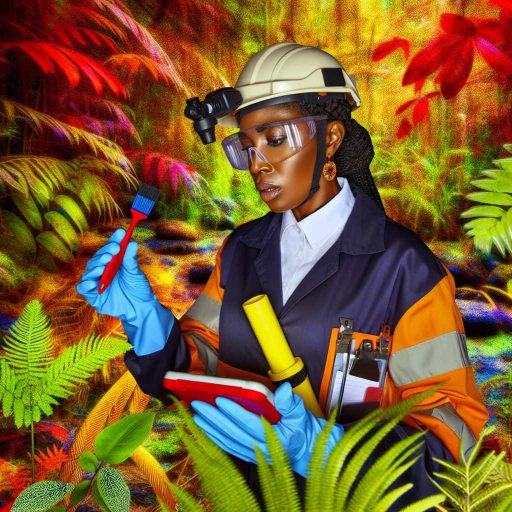Introduction:
Environmental safety is crucial for protecting our planet from harmful pollutants.
It is essential to preserve natural resources.
With the increasing awareness of climate change and sustainability, there is a growing demand for professionals in this field.
Education and Training:
To start a career in environmental safety, it is important to pursue a relevant degree in environmental science.
Occupational health, industrial hygiene, or a related field can be beneficial as well.
Additionally, obtaining certifications such as OSHA or NEBOSH can enhance your credentials.
This can increase job opportunities.
Gain Experience:
Internships and volunteer work are valuable for gaining practical experience.
Networking with professionals in the environmental safety industry can provide essential contacts.
Consider working with government agencies, consulting firms, or environmental organizations.
This can help you build your skills and knowledge.
Specialize:
Consider specializing in areas such as hazardous waste management or air quality control.
Water pollution prevention or emergency response planning may also be potential niches.
By focusing on a specific niche, you can become an expert in your field.
This specialization can help you stand out to potential employers.
Networking:
Attend conferences, seminars, and workshops related to environmental safety.
This will help expand your network and keep you updated on industry trends.
Join professional organizations to connect with like-minded professionals.
Examples include the National Environmental Health Association or the American Society of Safety Professionals.
Job Search:
Utilize online job boards, company websites, and networking events to search for openings in environmental safety.
Tailor your resume and cover letter to highlight your relevant experience and skills.
Be prepared for interviews by researching potential employers.
Practice common interview questions to enhance your confidence.
Career Path in Environmental Safety:
Starting a career in environmental safety requires dedication, education, and experience.
By following these steps and staying motivated, you can pursue a rewarding career.
This career will allow you to protect the environment and promote sustainability.
Research and Education:
– Conduct research on the field of environmental safety to understand its scope and importance.
– Explore relevant educational programs and certifications that can help you build a solid foundation.
– Consider pursuing a degree in environmental science or a related field to deepen your knowledge.
When starting a career in environmental safety, it is crucial to invest time and effort into research and education.
By understanding the field and gaining the necessary qualifications, you can set yourself up for success in this rewarding and impactful industry.
Gain Practical Experience:
Securing practical experience is crucial for starting a career in environmental safety.
Here are some tips on how you can gain valuable hands-on experience in the field.
Internships and entry-level positions are excellent opportunities to get your foot in the door and learn the ropes of environmental safety firsthand.
Look for companies, government agencies, or non-profit organizations that offer these positions.
Another way to gain practical experience in environmental safety is by volunteering for environmental organizations or participating in community clean-up events.
This hands-on experience will not only allow you to contribute to environmental initiatives but also broaden your understanding of environmental issues.
Attending workshops and conferences related to environmental safety is also a great way to expand your knowledge and network with professionals in the field.
These events often provide valuable insights, updates on industry trends, and networking opportunities that can help you kickstart your career in environmental safety.
Overall, gaining practical experience through internships, volunteer work, and attending workshops and conferences is essential for building a strong foundation in environmental safety.
Transform Your Career with Expert Guidance
Get personalized mentorship consulting that’s tailored to your unique path. Our expert advice is actionable and exclusive.
Get StartedMake the most of these opportunities to learn, grow, and make a positive impact on the environment.
- Look for internships or entry-level positions in environmental safety.
- Volunteer for environmental organizations or participate in community clean-up events.
- Attend workshops and conferences to expand your knowledge and network.
You Might Also Like: Nigeria’s Efforts in Combating Deforestation
Networking for a Career in Environmental Safety
Networking with professionals is a crucial step in starting a career in environmental safety.
Connect with Professionals:
- Use LinkedIn to connect with professionals in the field.
- Attend networking events to meet industry experts.
Seek Mentorship Opportunities:
- Look for experienced environmental safety professionals who can mentor you.
- Learn from their experiences and seek guidance in your career path.
Join Industry Associations:
- Be part of industry associations or groups related to environmental safety.
- Stay updated on trends, regulations, and job opportunities in the field.
Networking with professionals not only helps you build connections but also provides valuable insights and guidance to navigate your career in environmental safety effectively.
You Might Also Like: Sustainable Practices in Environmental Safety
Develop Technical Skills:
Acquire relevant technical skills such as hazard identification, risk assessment, and environmental compliance.
Familiarize yourself with industry software and tools used in environmental safety.
Consider additional training or certifications to enhance your skill set.
You Might Also Like: Internships and Training in Environmental Management Tech
Specialize in a Niche Area:
Identifying a specific area within environmental safety that interests you is crucial for building a successful career in this field.
By focusing on a niche area, you can become an expert in that particular domain, making yourself more valuable to potential employers.
-
Identify a specific area within environmental safety that interests you (e.g. hazardous waste management, air quality monitoring):
Take some time to research different aspects of environmental safety and determine which area resonates with you the most.
Whether it’s hazardous waste management, air quality monitoring, or another niche, choose the one that aligns with your passion and career goals.
-
Gain expertise in that niche by taking specialized courses or attending workshops:
Once you’ve identified your niche area, it’s essential to acquire specialized knowledge and skills.
Look for relevant courses, workshops, or certifications that can help you build expertise in that specific area.
By investing in your education and skill development, you’ll become more competitive in the job market.
-
Position yourself as an expert in that particular area to stand out to employers:
Showcase your expertise in your chosen niche through various channels.
This could include creating a professional portfolio, writing articles or blog posts on industry-related topics, or presenting at conferences and events.
By establishing yourself as an authority in your niche, you’ll attract the attention of potential employers looking for specialized talent.
Specializing in a niche area not only sets you apart from other candidates but also allows you to focus your career on a specific area of interest.
By becoming an expert in your chosen niche, you can build a rewarding career in environmental safety and make a positive impact in protecting the environment.
See Related Content: Environmental Management Tech Certifications in Nigeria

Building a strong resume is crucial in starting a career in environmental safety.
Here are some tips to help you create a resume that stands out:
Highlight your relevant education, experience, and skills in your resume
- Include any degrees or certifications related to environmental safety
- List any relevant work experience, internships, or volunteer work
- Showcase your skills such as attention to detail, problem-solving, and communication skills
Tailor your resume to the job description when applying for positions
- Read the job description carefully and customize your resume to highlight the skills and experiences that match the requirements
- Edit your resume for each job application to emphasize why you are the best fit for the position
- Use keywords from the job description to ensure your resume gets noticed by applicant tracking systems
Showcase any related projects, research, or certifications that demonstrate your commitment to environmental safety
- Include any projects or research you have conducted related to environmental safety
- List any certifications you have obtained in environmental safety or related fields
- Show evidence of your commitment to environmental safety through your past work or volunteer experiences
By following these tips, you can create a strong resume that highlights your qualifications and sets you apart as a candidate for a career in environmental safety.
Seek Career Opportunities:
Explore job boards, company websites, and career fairs for environmental safety positions.
Consider working for government agencies, consulting firms, or large corporations in the field.
Be open to relocation for opportunities in different regions or countries.
Getting Started
To start a career in environmental safety, consider earning a degree in occupational health and safety.
Gain Experience
Internships and entry-level positions will provide valuable hands-on experience in the field.
Obtain Certifications
Obtain certifications such as Certified Safety Professional (CSP) or Occupational Health and Safety Technician (OHST).
Networking
Networking with professionals in the industry can lead to job opportunities and mentorship.
Continuous Learning
Stay current with industry trends by attending workshops, seminars, and conferences.
Professional Development
Continuously improve your skills through additional training and certifications to stay competitive.
Passion and Dedication
Having a genuine passion for environmental safety and dedication to the field is crucial for success.
Importance of Continuous Growth
Emphasize the importance of passion and dedication in pursuing a career in environmental safety.
Encourage continuous learning and professional development to stay competitive in the field.
Additional Resources
What is Environmental Law – And Why Does it Matter? | American …




